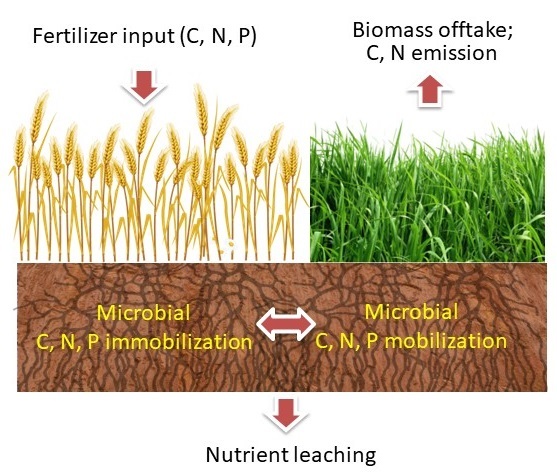
Optimizing the stoichiometric balance of soil carbon (C), nitrogen (N), and phosphorus (P) is essential for regulating nutrient cycling and enhancing nutrient use efficiency (NUE) in agricultural systems. However, the underlying mechanisms and effective strategies for optimization are only partially understood.
The Green ERA-Hub project NutriSTORM investigates the role of soil C:N:P stoichiometry and soil carbon amendments in nutrient turnover through i) long-term field-scale research site investigations across Europe (Ireland, UK, and Germany) ii) controlled greenhouse experiments that are informed by the field trial results, and iii) implementations as field scale.
NutriSTORM is financed by the Green ERA-Hub, a European initiative under the umbrella of Horizon Europe, with national funding agencies (DAFM, BMEL, DEFRA) financing our partners directly.
Utilizing state-of-the-art techniques such as metagenomic sequencing, quantitative PCR, enzyme assays, sensors and stable isotope tracing NutriSTORM aims to: (1) evaluate soil microbial contributions to nutrient cycling and stoichiometry across diverse agronomic systems (cereals, grassland); (2) elucidate microbial-driven C, N, and P turnover in response to bio-based fertilizers and its impact on NUE gains, crop yields, and plant-microbe interactions; and (3) develop and implement field-scale strategies to optimize NUE and reduce nutrient losses. In 2024, six field trials were sampled where soil amendments included the use of insect frass, spent brewers grains, straw return, animal slurry, dairy sludge as well as bio-fertilizers for in depth analyses.

The Green ERA-Hub under Horizon Europe, brings together all relevant ongoing and self-sustaining networks; (including ERA-Nets and European Joint Programme Cofund) in the Agri-food and biotechnolgy sector. The Hub thus represents a large part of Europe's national ministries, funders and research institutes within these themes.
